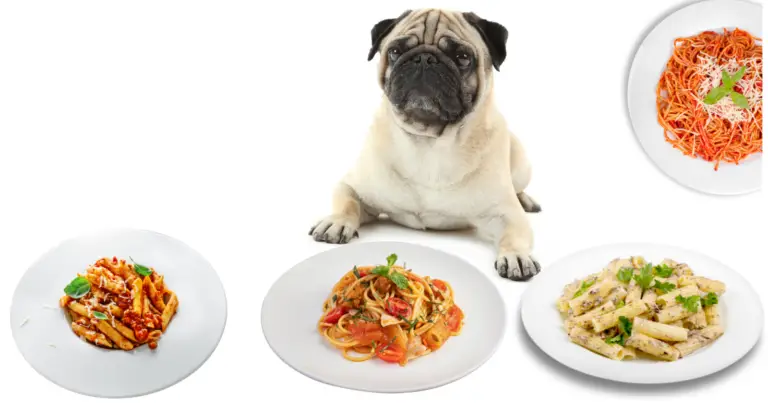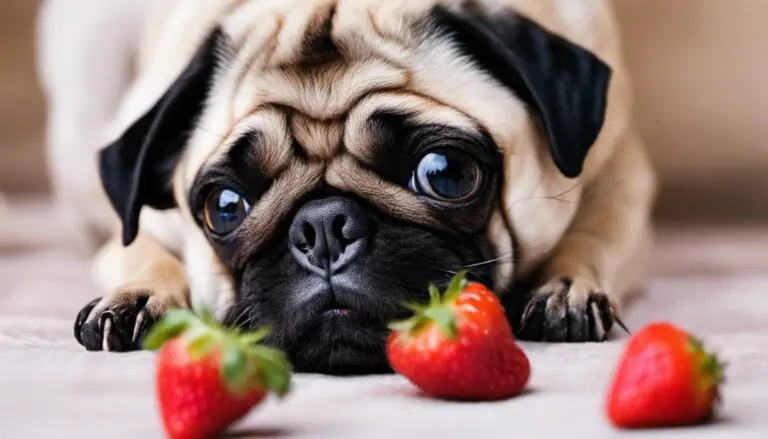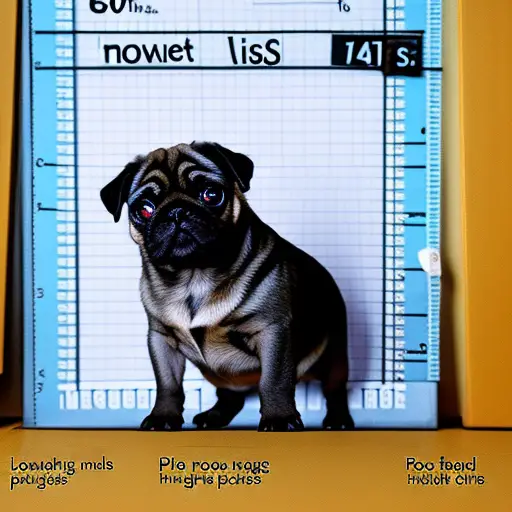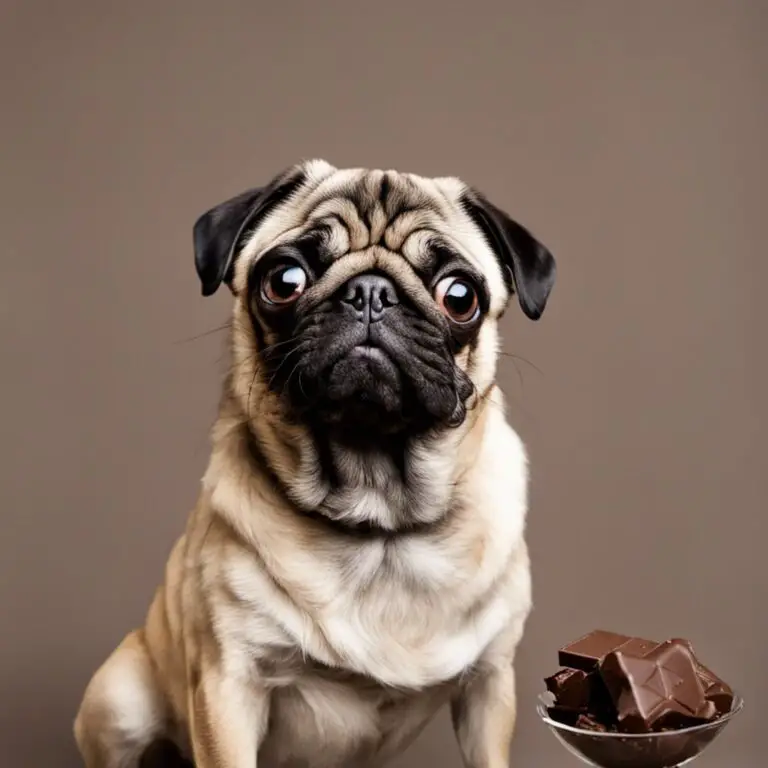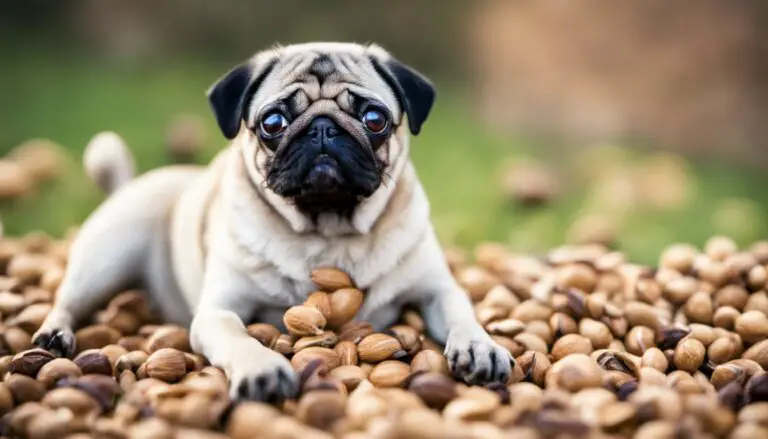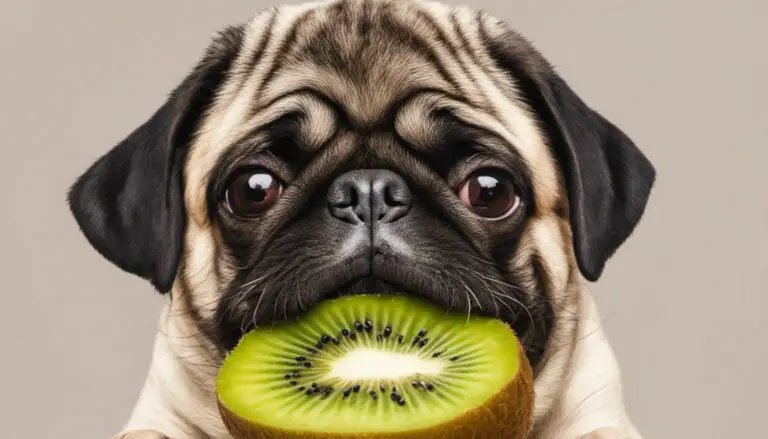Can Pugs Eat Bacon? A Comprehensive Guide to Feeding Your Pug Safely
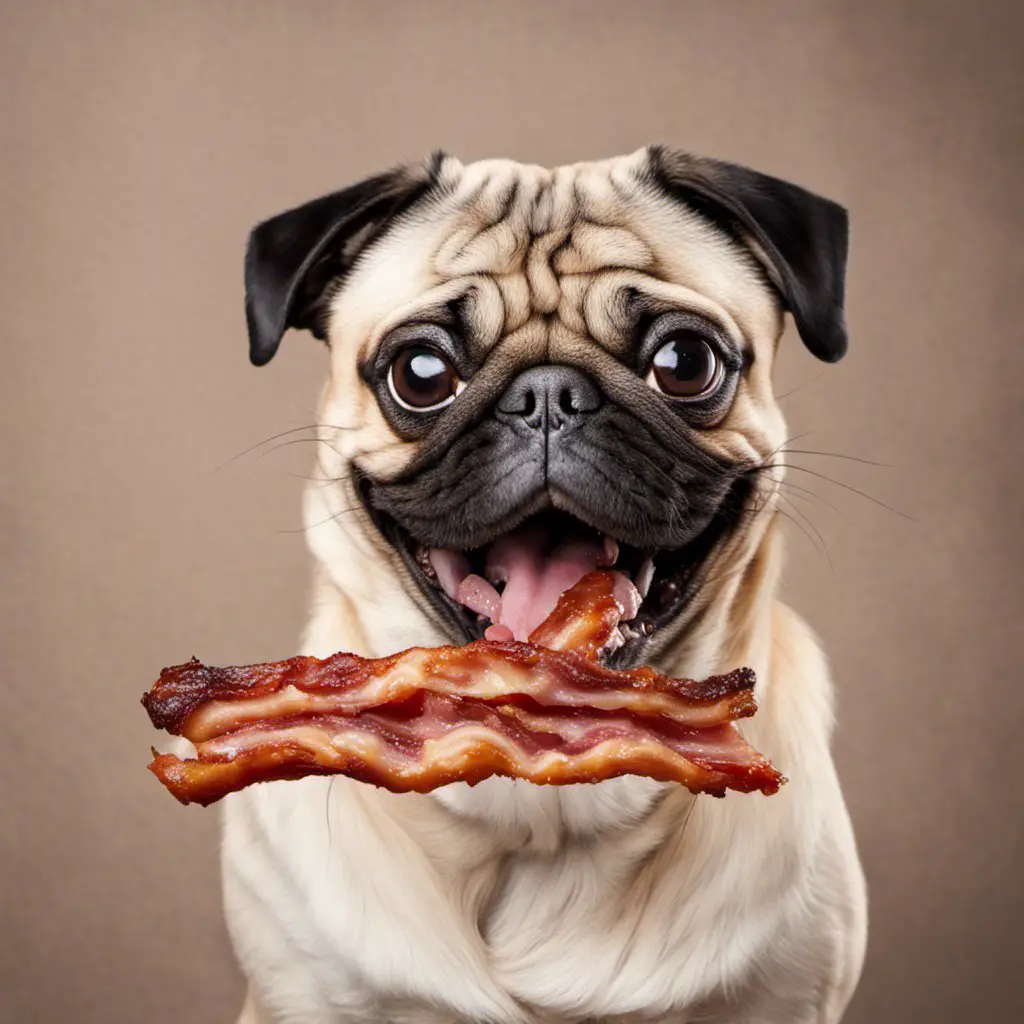
Can Pugs Eat Bacon? Bacon is a popular and flavorful food that many people enjoy, and it can be tempting to share a piece with your pet. As a Pug owner, you might wonder whether it’s safe for your furry friend to indulge in this tasty treat. The safety of feeding bacon to Pugs is a topic that deserves attention to ensure the well-being of your beloved companion.
While the aroma of bacon might make your Pug’s mouth water, it is important to consider the potential dangers of feeding them this savory treat. Bacon, both raw and cooked, is not necessarily toxic to dogs; however, it is a food that you should generally avoid giving to your pet. Consuming bacon can pose risks to your Pug due to its high fat content and the presence of unhealthy additives.
To maintain your Pug’s health and overall well-being, it is important to educate yourself on the appropriate food choices for these unique dogs. Being knowledgeable about their dietary needs will help you make informed decisions about what to feed them and keep them happy and healthy.
Contents
Table of Contents
Understanding Pugs Dietary Requirements
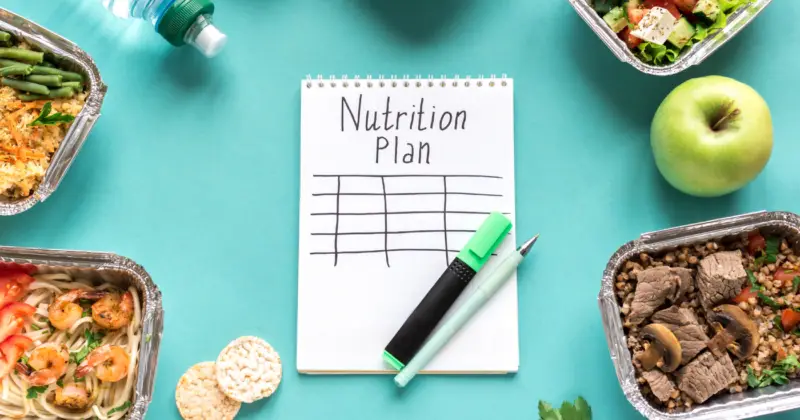
As a pug owner, it’s essential to understand their dietary requirements to ensure they remain healthy and happy. Pugs, like all dogs, are primarily carnivores, which means they need a diet rich in animal protein.
Get The Free Food Eating Guide That Keeps My Pug Happy and Playful Even at 13 Years Old
100% Beginner Friendly & Lists Real Foods Your Pug Can Actually Eat!
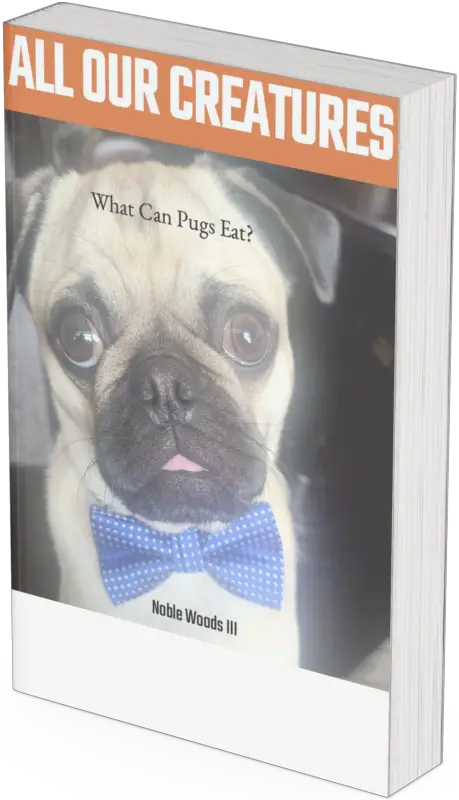
Protein is a significant component of a pug’s diet, as it helps with muscle growth and maintenance. A healthy pug diet should consist of around 18% crude protein, with the protein content in their food not exceeding 22%. Fats are also crucial, providing a concentrated source of energy. Adult pugs require about 5% crude fatty acids in their diet, while puppies need around 8%.
In addition to proteins and fats, pugs also benefit from a variety of fruits and vegetables, which offer essential vitamins, minerals, and fiber. However, not all fruits and vegetables are safe for pugs, so it’s essential to know which ones they can and cannot eat. Appropriate vegetables include potatoes, carrots, peas, and green beans, but avoid onions, garlic, and spices that may cause digestive issues.
When it comes to fruits, pugs can consume apples, bananas, and blueberries in moderation. But it’s critical to avoid fruits like grapes, raisins, and avocados, which can be toxic to dogs. It’s also important to remove any seeds or pits from the fruits before feeding them to your pug, as they can cause choking hazards or contain harmful compounds.
Although pugs can eat a variety of meats, it’s essential to ensure they consume lean cuts to avoid excessive fat intake. Suitable meat options include lean turkey, chicken, and beef, which provide essential nutrients like iron and fatty acids. Bacon, however, is not recommended due to its high salt and fat content, which can lead to health issues.
In conclusion, providing a diverse diet with appropriate proteins, fats, vitamins, and minerals is crucial for maintaining a pug’s health. By offering a variety of safe fruits, vegetables, and meats, you can ensure your pug receives the nutrients they need to thrive and enjoy a long, happy life.
Can Pugs Eat Bacon
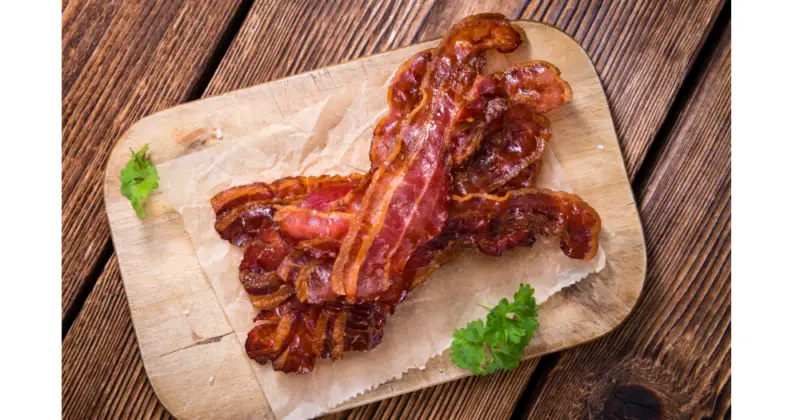
Pugs, like other dog breeds, can technically eat bacon. However, it’s important to remember that bacon is high in fat and salt, which makes it less than ideal for their consumption. In fact, regularly feeding your pug bacon could lead to health issues that may be harmful to them in the long run.
Bacon, being a type of meat, can provide some protein to your pug’s diet. However, the high levels of fat – approximately 12 grams in just 3 slices – can be detrimental to your pug’s health. Excessive fat intake may contribute to obesity, which is particularly concerning for pugs due to their smaller size and predisposition to weight gain.
Furthermore, bacon is typically high in salt, containing about 581mg of sodium per 3 slices. This excessive salt content could cause an upset stomach or even lead to more serious health problems over time. Consuming too much sodium may increase the risk of heart issues, kidney problems, and hypertension in dogs.
The concern surrounding cooked bacon also lies in the fact that it’s often prepared with various seasonings and spices, which can be harmful to your pug. Moreover, the cooking process may generate harmful compounds or substances that are not suitable for canine consumption.
In summary, while pugs might be able to eat bacon, it’s best to avoid feeding it to them due to the potential health risks associated with its high fat and salt content. Instead, consider offering your pug healthier alternatives such as lean meats, fruits, or vegetables that are easier for them to digest and provide the necessary nutrients.
The Health Risks of Bacon to Pugs
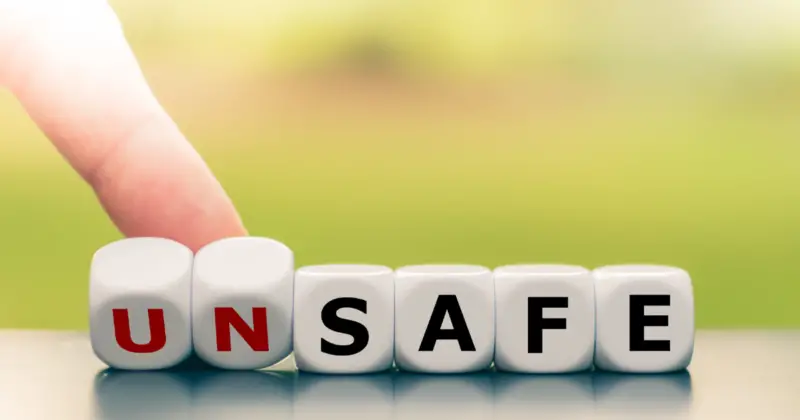
Bacon can be a tempting treat for pugs, but it is important to understand the potential health risks associated with feeding bacon to these small dogs. Bacon, being very high in sodium and fat, can lead to a number of negative health issues for pugs.
One of the more immediate risks of feeding bacon to a pug is the potential for gastrointestinal upset. Due to bacon’s high fat content, it can cause vomiting and diarrhea in pugs, making them feel unwell and even leading to dehydration. Apart from gastrointestinal problems, dogs consuming high levels of fat and sodium can develop pancreatitis. This is an inflammation of the pancreas that can be painful and, in some cases, life-threatening for your pet.
Bloat is another potential risk for pugs that consume bacon. This condition occurs when a dog’s stomach fills with gas, causing it to expand and put pressure on other organs. In severe cases, bloat can be life-threatening and requires immediate veterinary attention.
Additionally, feeding your pug bacon can contribute to obesity and weight gain. Pugs are already prone to becoming overweight, and adding high-calorie, high-fat foods like bacon can exacerbate this issue. Overweight and obese pugs are more likely to experience a variety of health issues, including joint problems, high cholesterol levels and an increased risk of diabetes.
Along with the above-mentioned health issues, pugs that are fed bacon may experience additional problems such as seizures and lethargy, which can be consequences of high levels of fat and sodium in their diet. Moreover, the high salt content in bacon can be hazardous to their kidneys and heart function.
In summary, despite being a tasty treat, bacon poses several health risks to pugs, including gastrointestinal upset, pancreatitis, bloat, obesity, and other related issues. It is important to prioritize your pug’s health and opt for healthier, dog-friendly treats instead of bacon.
Bacon’s Nutritional Content
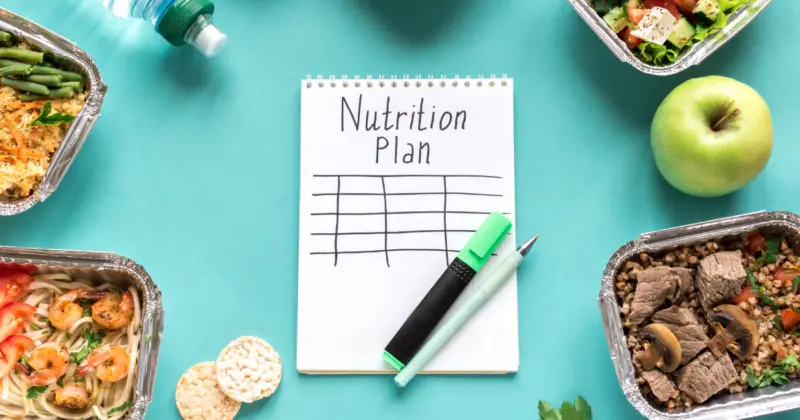
Bacon is a popular food item, known for its rich taste and satisfying texture. It is derived from pork and goes through a curing process, which involves the addition of salt and other preservatives. While tasty, bacon’s nutritional content may not be the best choice for your pug or any other dog.
A typical serving of bacon contains a high amount of fat. This is mainly because it consists of about 50% fat, with saturated fats comprising a significant portion. High-fat foods like bacon can lead to obesity and pancreatitis in dogs, as well as other health problems.
In addition to being high in fat, bacon also contains a significant amount of sodium. The curing process of bacon involves salt, which contributes to its sodium content. High sodium intake can lead to increased blood pressure in dogs, just as it does in humans, and can cause adverse effects on their kidneys and heart.
Bacon does contain protein, which is an essential nutrient for dogs. However, the protein content in bacon is relatively low compared to other meats, such as chicken or beef. Thus, relying on bacon as the primary protein source for dogs is not recommended.
Moreover, bacon contains minimal amounts of vitamins, minerals, and fiber. It offers little nutritional value in terms of vitamins and minerals necessary for maintaining a balanced diet for dogs. The lack of fiber also makes it less suitable for dogs since their diet requires a certain amount of fiber for healthy digestion.
Although bacon may be a tasty and tempting treat, it is essential to remember that its nutritional content might not be the best for pugs or other dogs. It is high in fat and sodium, and low in essential nutrients like vitamins, minerals, and fiber. To maintain a healthy and balanced diet, it is recommended to opt for more nutritious and wholesome food options for your canine companion.
Other Foods That are Harmful to Pugs
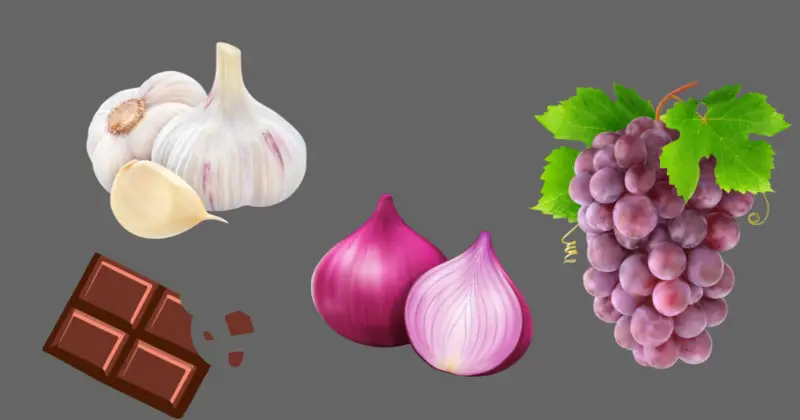
Chocolate is one of the most dangerous foods for pugs, as it contains the toxic substance theobromine which can lead to serious health issues for dogs. The toxicity of chocolate increases depending on the type and the amount ingested, so it’s best to avoid it altogether.
Onions and garlic should also be kept away from pugs. They contain compounds that can damage red blood cells, resulting in anemia. Even a small amount of these foods can lead to serious health problems for your pug.
Grapes and raisins are known to be highly toxic to dogs, including pugs. They can cause kidney failure and other severe symptoms, which can be fatal in some cases. So, it’s necessary to ensure your pug never consumes any grapes or raisins.
Avocado is another harmful food for pugs due to the presence of persin, a toxin that can lead to vomiting, diarrhea, and other health issues. Thus, it’s essential to avoid giving avocados to your pug as a treat or snack.
Many human foods can be harmful to pugs, especially those high in salt, sugar, and fat. For example, bacon is not recommended for pugs as it contains high amounts of salt and fat, which can lead to gastrointestinal problems for your dog.
Xylitol is a common sugar substitute found in many human foods like candies, gum, and baked goods. It can cause a rapid release of insulin in dogs, leading to hypoglycemia (low blood sugar), seizures, liver failure, and even death. So, always check the ingredients list before giving your pug any human food, and make sure it doesn’t contain xylitol.
Lastly, caffeine is another substance that is harmful to dogs, including pugs. Like chocolate, caffeine contains theobromine, causing similar negative effects on your pugs health. It’s essential to avoid giving any caffeinated beverages or foods to your pug to prevent potential health complications.
By being aware of these harmful foods and carefully monitoring your pug’s diet, you can help ensure their safety and well-being.
Safe Snacks and Treats for Pugs
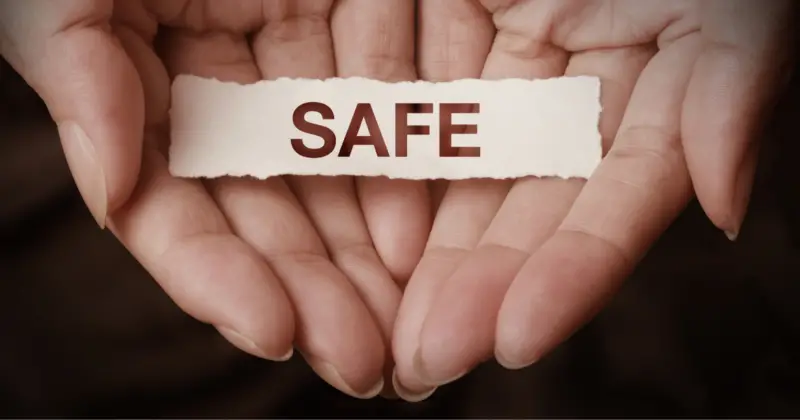
Pugs, just like any other dogs, love to indulge in treats and snacks. Providing them with healthy and safe options not only satiates their appetite but also helps in maintaining their overall well-being. Here are some snacks and treats that you can offer your pug without worrying about their health.
When it comes to vegetables, options like broccoli, carrots, and green beans make excellent treats for pugs. These vegetables are rich in vitamins, minerals, and fiber, which contribute to a balanced diet. However, make sure to give them in moderation, as large quantities of vegetables might cause digestive issues.
Fruits such as blueberries, strawberries, apples, bananas, and pears can be given to your pug as a delightful snack. These fruits are rich in antioxidants, vitamins, and other essential nutrients that help keep their immune system strong. However, ensure to remove any seeds or pits from the fruits, and serve them in small, bite-sized pieces to avoid choking hazards.
When treating your pug with meat, stick to lean and cooked options, as raw or high-fat meats can cause gastrointestinal issues. Opt for meats like chicken or turkey, and avoid processed meats like bacon to ensure your pug’s snack time is both delicious and healthy.
In case you prefer to give your pug store-bought treats, opt for dog treats specifically formulated for their dietary needs. Look for natural and low-calorie options that cater to their size and breed requirements.
Sweet potatoes are another nutritious and low-calorie snack for pugs. They can be offered as cooked and mashed, or even in small, dehydrated pieces. Sweet potatoes provide essential nutrients like vitamin A, vitamin C, and fiber, which make them a great addition to your pug’s snack time.
Remember to always give snacks in moderation, and consult with your veterinarian before introducing any new food items to your pug’s diet. Maintaining variety and balance with safe snacks and treats will keep your pug happy and healthy without compromising their well-being.
Recommended Pug Meal Plans
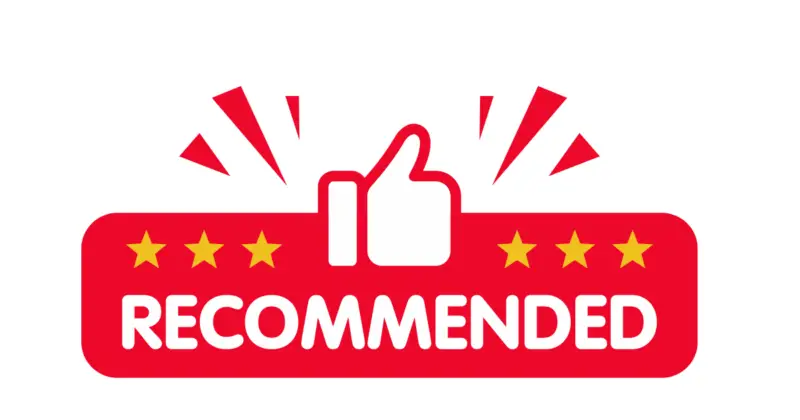
A balanced and nutritious diet is crucial for maintaining your pug’s overall health and well-being. To provide your pug with a well-rounded meal plan, it’s important to ensure variety and include a mix of high-quality dog foods, cooked meals, and some fresh ingredients.
One option for a pug meal plan includes feeding them a premium, high-quality kibble which is specially formulated for their nutritional needs. When selecting a kibble for your pug, look for one that lists real, whole meats as the first ingredient and avoids artificial preservatives and additives. This will ensure your pug is getting the necessary proteins, vitamins, and minerals.
Adding variety to your pug’s diet is essential to provide the necessary nutrients and prevent boredom with their meals. You can easily accomplish this by incorporating home-cooked meals into their meal plan. These meals can consist of lean meats like chicken, turkey, or fish, along with a mix of dog-safe vegetables like carrots, green beans, and broccoli. Be sure to cook these ingredients without any added salt, sugar, or seasoning to keep your pug’s meals safe and nutritious.
As a part of their meal plan, it’s also beneficial to occasionally incorporate fresh fruits and vegetables into their diet. Both raw and cooked vegetables, such as zucchini, peas, and sweet potatoes, are great options for adding variety. Remember to avoid feeding your pug bacon, as it contains high amounts of fat and salt, which can lead to gastrointestinal problems.
When it comes to their daily meal schedule, adult pugs typically require two meals per day. You should aim to provide around 0.5 cup of food containing 200 to 250 kcal of nutrients for each meal, depending on their age, weight, size, gender, and activity level. Making any changes to their diet should be done gradually to avoid upsetting their stomach.
To sum up, implementing a well-balanced meal plan that includes the right portion of kibble, home-cooked meals, and fresh fruits and vegetables is key to keeping your pug in good health. Maintaining variety in their diet will not only cater to their nutritional needs but also keep them interested and excited about their meals.
Signs of Food Allergies in Pugs
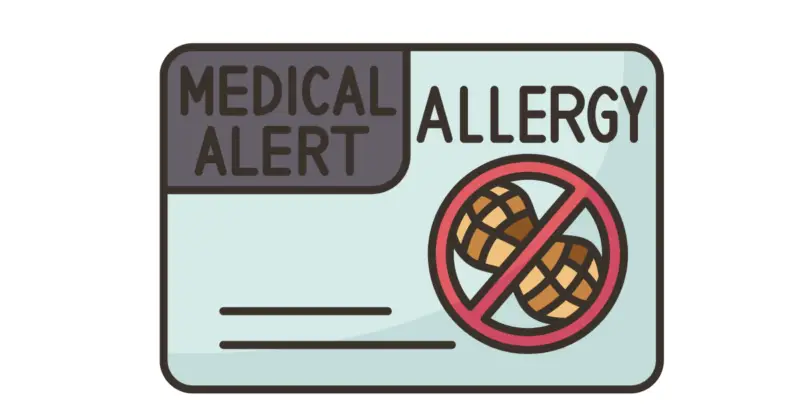
Food allergies in Pugs can cause several symptoms that may impact their health and well-being. These symptoms can manifest in different ways, affecting your Pug’s digestion, skin, and overall comfort. It is important to be aware of the common signs of food allergies in Pugs so that you can take appropriate action if needed.
One common sign of food allergies in Pugs is gastrointestinal issues such as diarrhea or vomiting 1. These symptoms may occur as a result of your Pug’s body reacting to a particular ingredient in their diet. If your Pug is experiencing persistent digestive problems, it may be worth considering whether a food allergy could be the cause.
In addition to digestive symptoms, food allergies can also cause dermatologic problems in Pugs. Your Pug may have a poor skin condition or an itchy coat due to an allergic reaction2. This can lead to excessive scratching or biting, indicating that your Pug is uncomfortable. If you notice these symptoms, it may be a sign that your Pug has an allergy.
Chronic ear infections or foot infections are also potential indications of food allergies in Pugs3. These infections can be caused by yeast and/or bacteria, which may be exacerbated by an underlying allergy. If your Pug frequently suffers from ear or foot infections, it could be a sign that they are struggling with a food allergy.
In summary, if your Pug exhibits gastrointestinal issues, skin problems, or chronic infections, it is important to consider the possibility of food allergies. Consulting with a veterinarian can help you determine the cause of these symptoms and provide appropriate treatment for your Pug’s needs.
Can Pugs Eat Bacon? Watch this
Ensuring a Healthy Weight for Your Pug
Pugs, like many dog breeds, can be prone to obesity and being overweight, which is detrimental to their overall health. To maintain a healthy weight for your Pug, a balanced diet and proper exercise are crucial.
An essential aspect of keeping your Pug’s weight in check is feeding them in moderation. On average, a Pug needs about 25-30 calories per pound of body weight per day. For example, a 15-pound Pug would require approximately 375-450 calories per day source. Bear in mind that this is an estimate, and the actual calorie intake needed may vary depending on your Pug’s age, activity level, and overall health.
When it comes to the diet itself, it is necessary to avoid feeding your Pug foods high in fat and salt, such as bacon. Although Pugs can technically eat bacon, the high fat and salt content make it unsafe for them to consume, potentially leading to digestion issues or more severe illnesses source.
Scheduled feeding rather than free feeding is highly recommended for Pugs over the age of 12 weeks. This method of offering a certain number of meals at set times helps control their calorie intake and prevent overeating source.
In addition to a proper diet, regular exercise is crucial for preventing obesity in Pugs. A daily routine that combines walks, playtime, and mental stimulation will not only help your Pug maintain a healthy weight but also promote overall wellness.
Remember, achieving and maintaining a healthy weight is vital for your Pug’s well-being. Monitoring their diet, feeding them in moderation, and incorporating daily exercise will help ensure a long, happy life for your furry companion.
The Role of Veterinarians in Pugs Diet
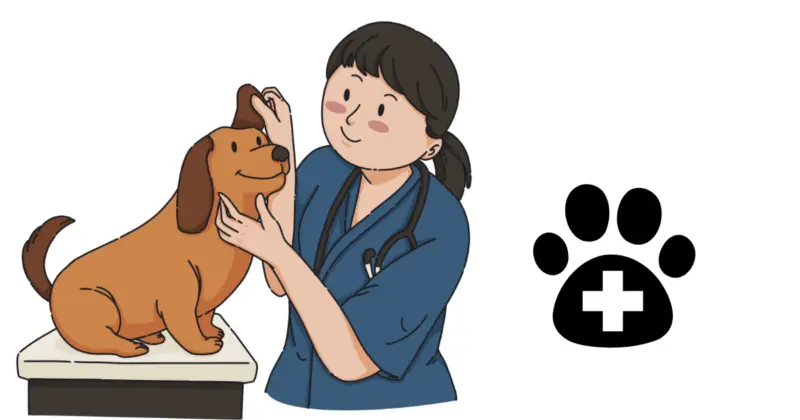
Pugs have unique dietary requirements and are prone to obesity, making it essential for owners to consult with a veterinarian in determining the optimal diet plan. Veterinarians play a crucial role in assessing a pug’s overall health and nutritional needs. They have the expertise to recommend the appropriate balance of proteins, fats, carbohydrates, vitamins, and minerals to support a healthy immune system and prevent various health issues.
Bacon, in particular, is high in fat and salt content, making it potentially harmful to pugs. A veterinarian can provide guidance on whether it is safe to include bacon in a pug’s diet and what potential health risks it may pose. With their knowledgeable advice, pug owners can make informed decisions on feeding their pets while considering their breed’s specific metabolic differences.
Additionally, veterinarians can help pug owners monitor their pet’s weight and identify early signs of obesity or other health problems related to their diet. A proactive approach involving regular check-ups can ensure timely adjustments to the pug’s food intake, thus minimizing the risk of diet-related issues.
In summary, involving a veterinarian in the pug’s diet plan is crucial to ensure the pet’s well-being. Their professional expertise enables them to guide owners in maintaining the right balance of nutrients, while avoiding harmful food items such as bacon. Furthermore, check-ups with a veterinarian can help prevent and detect diet-related health issues, supporting a pug’s overall wellness and immune system.
Effects of Poor Diet on Pugs Coat and Teeth
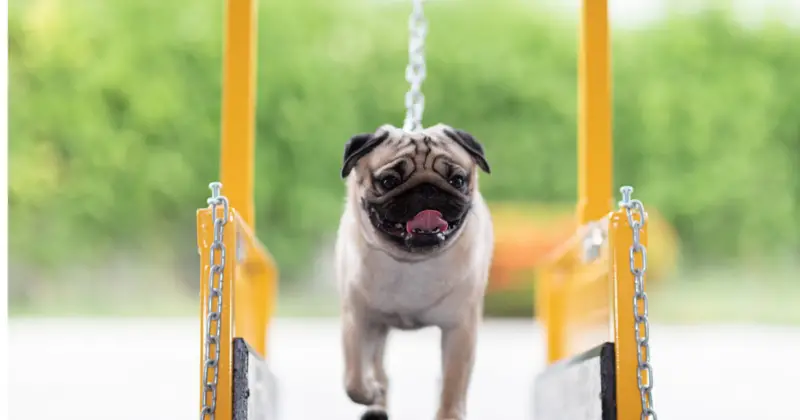
A poor diet can significantly impact the coat and teeth of a pug. This breed tends to have a predisposition to dental issues and losing hair, making it crucial for pug owners to focus on proper nutrition for maintaining their pet’s overall health.
Lack of essential vitamins and minerals in their meals can lead to brittle and dull coats. Omega fatty acids, in particular, play a vital role in ensuring a shiny and healthy coat. Feeding pugs a diet rich in Omega-3 and Omega-6 fatty acids, such as fish oils and flaxseeds, can greatly enhance the texture and shine of their fur.
The teeth of pugs are also vulnerable to decay because of their compressed jaw structure, which can contribute to overcrowding and tartar buildup. Bad bacteria accumulate faster in their unique jaw, making it essential to feed your pug food that helps maintain dental health. A diet with proper balance of nutrients and vitamins ensures the prevention of plaque and supports the development of healthy teeth.
Pugs’ digestion could also suffer from improper diets, as it affects their coat and teeth health. Feeding them food rich in fiber, vitamins, and minerals can prevent gastrointestinal tract complications, ensuring smooth digestion and better absorption of nutrients.
In summary, maintaining a balanced diet for your pug, rich in vitamins and nutrients, directly impacts their coat and teeth health. Providing optimum nutrition supports their digestive system, preventing unnecessary health issues and keeping your pug looking and feeling great.
Poisoning in Pugs
Pugs, like other dog breeds, can be susceptible to poisoning if they consume certain foods or substances. One common cause of poisoning in dogs is the consumption of bacon. Feeding your pug bacon is not recommended because of the high amount of sodium, nitrates, nitrites, and unhealthy fats, which may harm your dog’s health and lead to pancreatitis or other serious issues. The dangers of feeding your pooch bacon should be considered before incorporating it in their diet.

Another dangerous substance is bacteria, such as those found in moldy or stale food. It is crucial to properly store dog food and avoid giving pugs any moldy or stale meals. Mycotoxins produced by mold, particularly in dry dog food, can cause pugs to fall sick if consumed. Ensure that your pug’s food is fresh and adequately stored to prevent any bacterial growth.
Some human foods are also highly toxic to pugs, like chocolate. Chocolate contains theobromine, a toxic substance that can be fatal for pugs. Make sure to keep harmful substances like these out of your pug’s reach, and educate any household members on the importance of not feeding these dangerous foods to the dog.
If your pug ingests a poisonous substance, symptoms such as vomiting, diarrhea, lethargy, and sometimes seizures may occur. If you suspect your pug has been poisoned, it is essential to seek veterinary help immediately. The faster you can receive treatment for your pug, the better their chances of recovery are.
It is important to keep a close eye on what your pug consumes to protect them from harm. By understanding the substances that are toxic to pugs and avoiding them, you can minimize the risk of poisoning and ensure your pet lives a healthy and happy life.
How to Handle a Choking Pug
Pugs, being a brachycephalic breed, have a more sensitive and prone to choking disposition than other dogs. When your pug is choking, it can be both frightening and stressful; therefore, it is essential to know how to handle the situation calmly and effectively.
Identify the Signs of Choking
Firstly, learn to recognize the signs of choking, which may include:
- Gagging or coughing
- Pawing at the mouth
- Difficulty breathing
- Blue or purple gums
- Unresponsiveness
React Quickly and Calmly
Upon noticing any of these symptoms, immediately approach your pug, but remain calm as it can sense your anxiety and could potentially panic. Examine your pug’s mouth to check for any visible foreign objects causing the blockage. If you can gently and safely remove the object, do so.
Perform the Heimlich Maneuver
If the object is not accessible or remains lodged, perform the Heimlich maneuver for dogs:
- Stand behind the pug and gently lift it so that its hind legs are off the ground.
- Place your hands around the belly, making a fist with one hand and grasping the fist with your other hand.
- Position your hands just below the ribcage and apply firm and quick upward and inward thrusts.
- Perform a few repetitions, checking after each time if the foreign object has been dislodged.
Seek Veterinary Assistance
After either successfully removing the obstruction or if the pug’s condition does not improve after following the previous steps, seek immediate veterinary assistance. It is crucial to ensure your pug receives any necessary further treatment and assessment for possible injuries caused by the choking incident.
By being knowledgeable about choking hazards and prepared for emergencies, you can confidently help your sensitive pug in a choking situation and potentially save its life.
FAQs: Can Pugs Eat Bacon
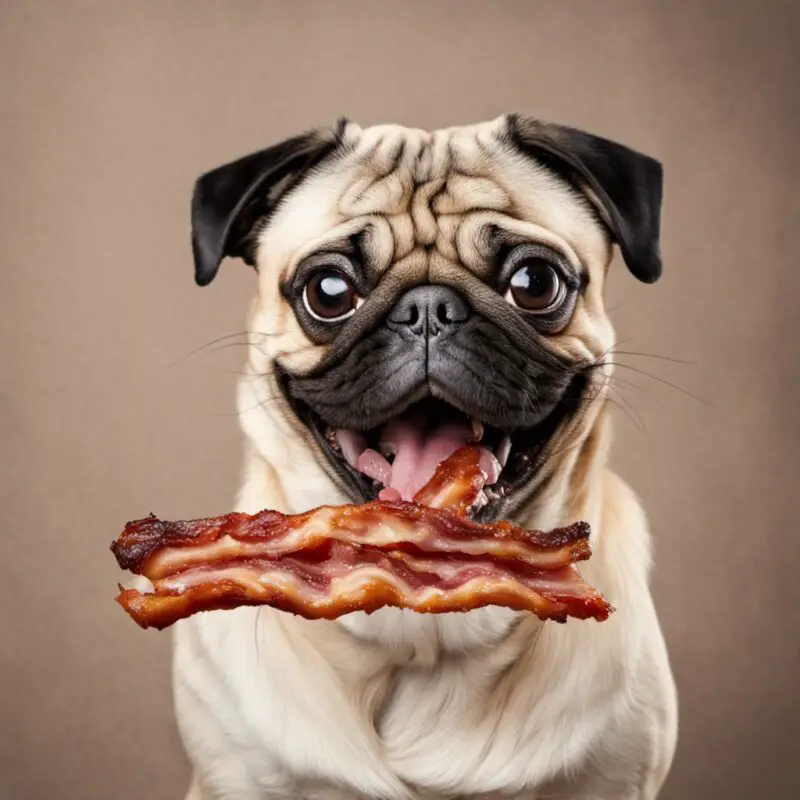
Can pugs safely consume turkey bacon?
While turkey bacon may contain less fat than regular bacon, it is still high in sodium and can cause digestive issues in pugs. It is best to offer healthy, low-sodium treats instead, to avoid potential health problems.
What are typical dietary restrictions for dogs?
Dogs should avoid foods that are toxic or harmful to them, such as chocolate, grapes, raisins, onions, garlic, avocado, and alcohol. High-fat, high-sodium, or heavily processed foods should also be limited, as they can cause gastrointestinal issues, pancreatitis, and other health concerns.
How to handle pugs ingesting cooked bacon?
If your pug has consumed a small amount of cooked bacon, monitor them for signs of distress, such as vomiting, diarrhea, or lethargy. If your dog displays any of these symptoms, consult your veterinarian. For future reference, refrain from giving your pug cooked bacon, as it can lead to long-term health problems due to its high fat and sodium content.
Is bacon and cheese suitable for pugs?
Cheese, like bacon, should be limited in a pug’s diet. While small amounts of cheese can be a safe treat, excessive intake can lead to digestive issues. Combined with the high fat and sodium content in bacon, offering both can increase the risk of health complications for your pug.
Is raw bacon appropriate for dogs?
No, raw bacon is not suitable for dogs, as it may contain harmful bacteria like Salmonella or E. coli. Moreover, the high fat and salt content in bacon, raw or cooked, can cause health problems in dogs. Stick to healthier, dog-friendly treats.
Are there any health benefits for dogs eating bacon?
There are no significant health benefits for dogs consuming bacon. The high fat and sodium content in bacon can contribute to obesity, hypertension, and gastrointestinal issues. Instead, opt for healthy, low-sodium dog treats that provide essential nutrients without posing potential health risks.

